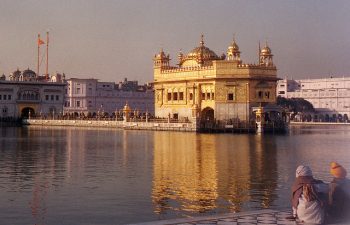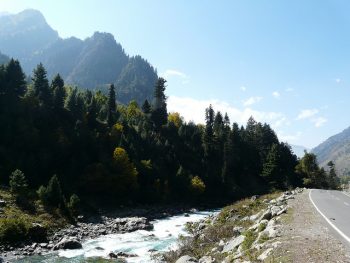Upendranath Ashk: Rebel, Misfit, Iconoclast (Part 1) Posted by Rachael on Aug 28, 2017 in Hindi Language, Uncategorized
Speaking of egotistical and notoriously temperamental writers (ahem…Sahir Ludhianvi), perhaps no name is as infamous as that of Upendranath Ashk (उपेन्द्रनाथ अश्क)…that is, for those who know his name at all. The reason he is little known perhaps has a great deal to do with the fact that he is almost never assigned in Hindi classrooms, either to native Hindi speakers or those learning Hindi as a second language. In fact, it was not until graduate school that I came to learn of this controversial writer. But, once I began reading his works, I came to love his style, despite the overwhelmingly negative press surrounding his “unique” personality.
Born Upendranath Sharma to a Brahmin family in 1910 Jalandhar, Punjab, Ashk, like many of his contemporaries and predecessors (in fact, the famous author Munshi Premchand was his mentor of sorts), began his writing career composing in Urdu. Prior to a formal career, he first began writing by composing Punjabi couplets when he was about 11. In 1926, he officially began writing in Urdu with the guidance of the Jalandhari poet Muhammad Ali “Azar.” Later, when he was in college, he published his first collection of short stories in 1930, called Nau Ratan/नौ रतन (Nine Jewels). It was also in college that he adopted the pen name “Ashk” (अश्क, which means “teardrop” in Urdu) to honor a childhood friend whose untimely demise colored the rest of his life. It was common at this time for poets, especially those writing in Urdu, to adopt a “pen name,” or “takhallus” (تخلص/तख़ल्लुस) as it is called in Urdu.
Inspired by Premchand and the knowledge that Hindi was becoming a more popular medium for literature, Ashk switched to writing in Hindi in 1932. At that time, attempting to make inroads into the field of Hindi literature was like trying to enter an exclusive club of self-righteous snobs. The combination of Ashk’s “Punjabi-ness,” his pugnacious personality and his lack of “nativeness” to the Hindi scene (his mother tongues were Punjabi and Urdu), resulted in Ashk feeling like an outsider for almost all of his career. While some of this pariah status was undoubtedly due to Ashk’s paranoia and his disagreeable and idiosyncratic nature, Ashk had hit the nail on the head, so to speak, in terms of feeling like an outsider in a “Hindi club” populated almost solely by native speakers of Hindi from Uttar Pradesh and surrounding areas. Clearly, some of them considered themselves superior to Punjabi “fledglings” to the field, such as Ashk, who wrote biting satire on the present state of affairs in Nehruvian India (1947-1964).
In the following short story, with an English translation provided as well, Ashk pokes fun at the “new class of tourist” that has arisen with the faltering prosperity of the Nehruvian era; these people are cheap and petty to an extreme degree, but they now have the means to travel to “exotic locales” within India, such as Kashmir, to the annoyance of the locals and the chagrin of the protagonist, who is a middle class artist.
“The Daal Eaters” (दालिये), published 1955
पहलगाँव (name of a town) की सुबह पिछले दिन से कुछ अौर सुन्दर अौर आकर्षक (attractive) छवि (visage, image) लिए हुए उदय हुई (to rise, ascend) थी । सामने के पहाड़ (mountain) की हिम–मण्डित (snow-covered) चोटियों (peaks) पर सफ़ेद बादल लहरा रहे थे (rippling, swaying, waving) । भिनसारे में (dawn) पत्थरों (rocks) से टकराकर (colliding) फेनोच्छवास (exhalations of froth) छोड़ता हुआ लिद्दर (name of a river) अौर उसक किनारे–किनारे बसे अनगिनत (countless) छोटे–बड़े ख़मों (bend) की दुनिया बड़ी ही भली लग रही थी । छड़ी (walking stick) उठाकर मैं लिद्दर की सैर (trip, walk) को चल दिया ।
That morning in Pehelgav had risen with a more lovely visage than the day before. White clouds rippled on the snow-crowned peaks of the mountain before me. At dawn, colliding with the rocks and releasing sighs of froth, the Liddar and the world of countless large and small bends settled along its banks looked very pleasing. I picked up my walking stick and left for a stroll along the river.
होटल से चन्द (a few) ही क़दम (steps) दूर गया हूँगा कि किसी ने पीछे से मेरे कन्धे (shoulder) पर हाथ रखा । मैं चौंककर (to be startled) मुड़ा,
“अरे, चोपड़ा साहब! कब आये ?”
“हम तो सात दिन से आये हुए हैं, आर्टिस्ट साहब (Artist Sahab=the protagonist’s title/name), आप कब आये ?”
“मैं तो परसों (day before yesterday) आया हूँ, बहुत थक गया (tired) था, इसलिये कल आराम (relax) करता रहा । आज सोचा, ज़रा निकट से (nearby) लिद्दर के दर्शन करते (to pay obeisances/respects to, lit. to worship) आयें ।”
“क्या बात है लिद्दर की!” चोपड़ा साहब ने सामने पत्थरों पर शोर मचाते (making noise), झाग उड़ाते (letting fly foam), अपने पानी के ज़हरमोहरा (lit. bezoar stone, which is an antidote to poison; usually dark brown in color) रंग को फेनोच्छवासों से हल्के हौलदिली (cowardly, easily frightened) रंग में बदलते हुए लिद्दर को देखकर कहा, “ यह न हो तो पहलगाँव में क्या रखा है! हम तो भाई लिद्दर में नहाते (bathe) हैं, यहीं कपड़े धोते (wash clothing) हैं, यहीं दोपहर गुज़ारते (spend the afternoon) हैं ।”
I must have been only a few steps from the hotel when someone touched me on the shoulder. Startled, I turned around,
“Oh, Chopra Sahab (sir)! When did you get here?”
“It’s been a week since we got here, Artist Sahab. How about you?”
“I got here the day before yesterday. I was very tired, so I just relaxed yesterday. Today I thought why not pay my obeisances to the Liddar.”
“What a splendid river (the Liddar)!” He looked out at the Liddar as it made a din on the rocks and sent foam flying up, the color of its water seeming to change in fright from a dark brown to a pallid hue with its sighs of froth. Then, he said, “If this wasn’t here then what would be left in Pehelgav! We bathe in the Liddar, bhai (brother), we wash our clothes in it and we even spend the afternoon here.”
“कब तक रहने का इरादा (intention) है?”
“अरे आर्टिस्ट साहब, आये तो हम दो–तीन दिन रहने के ख़याल (idea, thought) ही से थे, पर ये भाई साहब जाने ही नहीं देते।” …अौर सहसा (suddenly) पलटकर (turning) उन्होंने अपने साथ वाले आदमी को मेरा परिचय (introduction) दिया—“आप इन्हें नहीं जानते ?” वे मेरी अोर संकेत करते (to gesture, indicate) हुए बोले, “दिल्ली (Delhi) के बड़े प्रसिद्ध (famous) आर्टिस्ट हैं, इनकी तस्वीरें तो राष्ट्रपति–भवन (Presidential palace) में होनी चाहिए, लेकिन इन्हें इसकी चिन्ता (worry, care) ही नहीं, बस बनाते हैं अौर दोस्तों को बाँट देते (distribute, share) हैं । लेकिन समझ लीजिए, जिनके पास इनकी एक–एक तस्वीर है, हज़ारों (thousands) रुपयों की दौलत (wealth) उनके पास है ।”
“Till when do you plan to stay?”
“Oh Artist Sahab, we came with the intention of staying only two or three days, but this gentleman just won’t let us leave.” And, turning suddenly, he introduced me to the man who was with him—“You don’t know him?” Gesturing toward me, he said, “He’s a very famous artist in Delhi; his pictures should be in the presidential palace, but he doesn’t care about this (selling them) at all. He just makes them and shares them with his friends. But, mind you, anyone who owns one of his pictures, owns thousands of rupees of wealth.”
उन “भाई साहब” ने नमस्कार (greet) किया । विवश (helpless) मैंने भी खीसें निपोर दीं (grimace, or bear one’s teeth) । फिर मुझे उनका परिचय देते हुए चोपड़ा साहब बोले, “अौर ये हैं हमारे भाई साहब, यहाँ विज़िटर्ज़ ब्यूरो (Visitor’s Bureau) में काम करते हैं, बड़े सज्जन पुरुष (gentlemanly man) हैं । इन्हीं के घर में हम टिके हुए (staying) हैं । हमें मालूम ही नहीं हुआ कि हम पराये (another’s, a stranger’s) घर में हैं।”
मैंने उन्हें नमस्कार किया । अबके (now) उन्होंने खीसें निपोर दीं ।
“आप कहाँ ठहरे हैं (staying)?” क़दम बढ़ाते हुए (walking forward) चोपड़ा साहब ने मुझसे पूछा ।
“मैं इसी होटल के तीन नम्बर के कमरे में हूँ।” मैंने मुड़कर सामने होटल की अोर इशारा करते (gesturing toward) हुए कहा ।
“आप टेण्ट (tent) क्यों नहीं लगा लेते?” भाई साहब बोले ।
“मैं कुछ ही दिन के लिए आया हूँ, नौकर (servant) साथ नहीं लाया, इसलिए होटल में टिक गया हूँ।”
“अच्छा चोपड़ा साहब, आपको तो साथी (companion) मिल गये ।” भाई साहब ने चोपड़ा के कन्धे को थपथपाते हुए (pat or tap)) कहा, “मैं चलूँ, मुझे तैयार होकर (get ready) दफ़्तर (office) पहुँचना है, आप इनके साथ लिद्दर की सैर कर आइए !” अौर फिर मुझसे बोले, “आपसे मिलकर मुझे बड़ी खुशी हुई । मुझे भी कुछ ब्रश–अश चलाने का शौक (hobby) है । मैं अपनी दो–चार तस्वीरें आपको दिखाना चाहता हूँ, यदि समय दें तो…”
“ज़रूर लाइए ।”
अौर वे हाथ जोड़कर चले गए ।
That “gentleman” greeted me. Helpless, I grimaced at him. Then, Chopra Sahab said as he introduced him to me, “And this is our dear friend; he works in the Visitor’s Bureau here. He’s a great gentleman. We’ve put up in his house. It doesn’t even seem like we’re in someone else’s house.” I greeted him. Now it was his turn to grimace at me. “Where are you staying?” Chopra Sahab asked me as we continued walking.
“I’m in Room #3 of this hotel.” I said, turning and gesturing to the hotel opposite.
“Why don’t you set up a tent?” The gentleman said.
“I’ve only come here for a few days and didn’t bring my servant, that’s why I’ve put up in a hotel.”
“Well, Chopra Sahab, you’ve found a companion.” The gentleman said as he thumped Chopra on the shoulder, “I’ll be off; I have to get ready and go to the office. Please take a stroll along the Liddar with him!” And then he continued to me, “It was a pleasure meeting you. I also like to push around a brush from time to time. I’d like to show you two or three of my pictures, if you have time…”
“Of course, please bring them by.”
And, joining his hands in farewell, he left.
Stay tuned for Part 2 of this story, coming next week!

Build vocabulary, practice pronunciation, and more with Transparent Language Online. Available anytime, anywhere, on any device.






